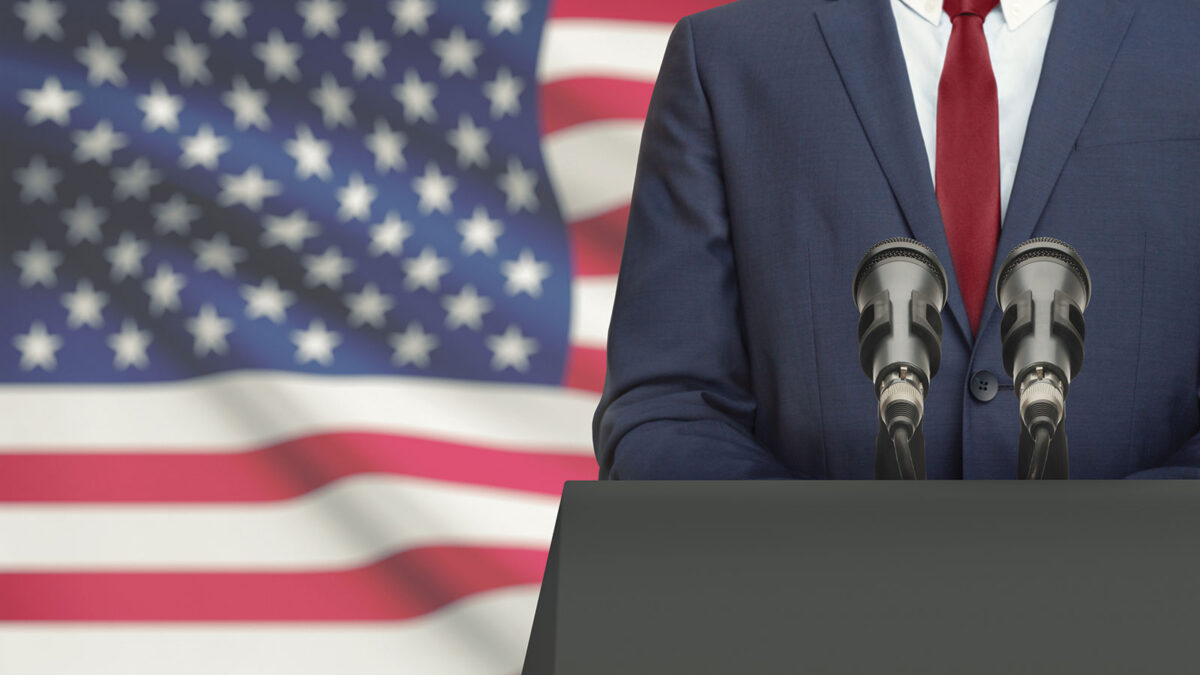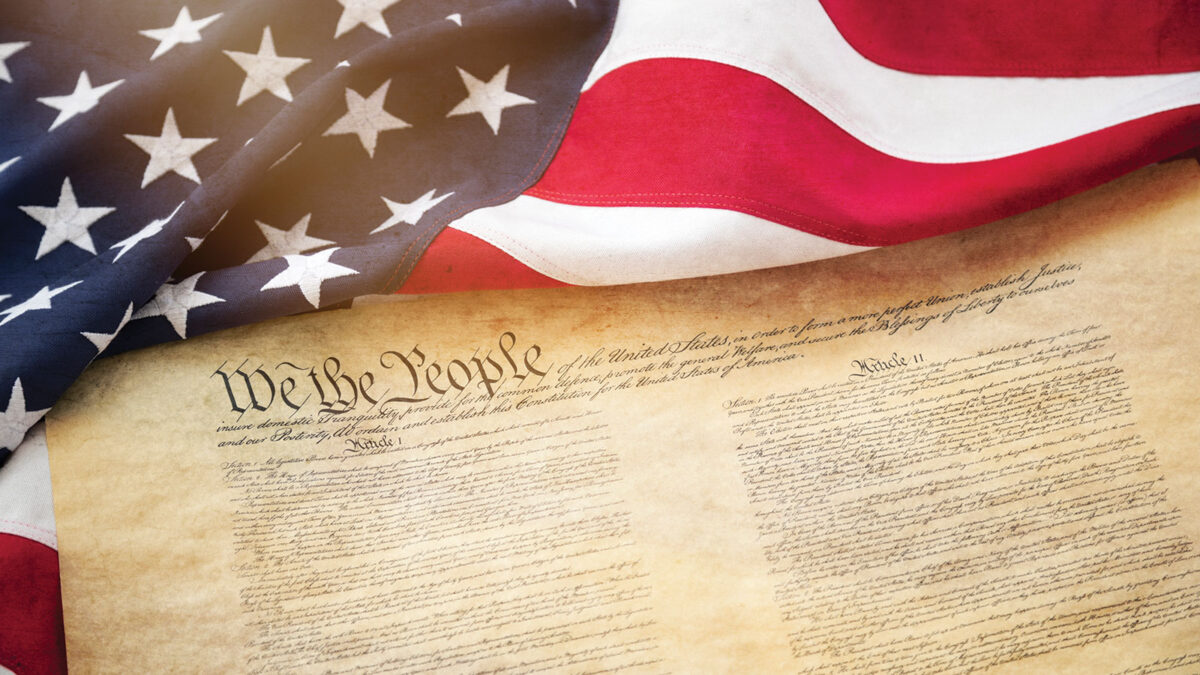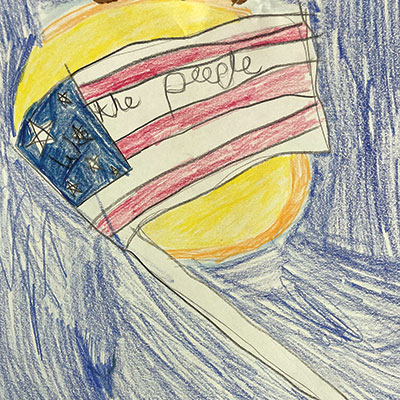
CBA’s 2025 Law Day Contest
The Constitution’s Promise: Out of Many, One
May/June 2025
Download This Article (.pdf)
The CBA helped celebrate Law Day this year with an art and essay contest for students across Colorado. Elementary school students were asked to submit original artwork, while middle- and high-school students were asked to submit essays, all centered on the 2025 Law Day theme, “The Constitution’s Promise: Out of Many, One.” One winner was selected in each age group. The CBA congratulates Aubrey Mangum, Delilah Fegan, and Hazel Bullock for their prize-winning work, and thanks all the other students who participated in this important civics lesson.
Elementary School Art Contest

 The task: Using any medium, create original artwork reflecting this year’s Law Day theme, “The Constitution’s Promise: Out of Many, One.”
The task: Using any medium, create original artwork reflecting this year’s Law Day theme, “The Constitution’s Promise: Out of Many, One.”
First Prize: Aubrey Mangum, 5th Grade, Broadway Elementary School
Middle School Essay Contest
The task: Write a 500-word essay explaining how the Constitution brings people together and helps people with different opinions work together.
 First Prize: Delilah Fegan, 7th Grade, Fountain Middle School
First Prize: Delilah Fegan, 7th Grade, Fountain Middle School
How the Constitution Affected America
Before the Constitution was created, America had many weaknesses. Luckily, on September 17, 1787, the Constitution was formed. It helped to make amends to the existing government while fixing problems of the past. The Constitution helped bring people together politically and socially.
First, the Constitution impacted America politically by affecting power and rights. The first three articles of the Constitution state that power is divided between three branches: judicial, executive, and legislative. The articles state that each branch is responsible for a certain duty in the government and establish that not one branch of government will have more power over the others. This helped America ensure that power would not consume those who craved it. This would also mean that business was divided amongst the three branches. The Fourteenth Amendment states, “All persons born or naturalized in the United States, and subject to the jurisdiction thereof, are citizens of the United States and of the State wherein they reside.” This means that all citizens of the United States have equal rights and responsibilities. This is how the Constitution impacted the United States politically in terms of power and rights.
In addition, the Constitution had social impacts on discrimination and segregation. The Fifteenth Amendment to the Constitution gave African Americans the right to vote, and the Nineteenth Amendment gave women the right to vote. This helped to make advancements and progress on a better path to equality. The Fourteenth Amendment also helped in the advancement of the elimination of segregation, while declaring that all citizens will have equal rights and are all created equal. This means that every American citizen should have equal rights and should be treated equally. This is how the Constitution made impacts on the social aspects of discrimination and segregation.
Moreover, the Constitution helped to make an organized and well-developed government. It helped different people to work together by limiting prejudiced behavior. This concept left room for constant improvement, showing that the world will never be perfect, but it can always change. While establishing a system of checks and balances, the founding fathers made sure that the United States would no longer be consumed by power and overruling taxes. They believed that citizens should have the freedom to be whoever they want and live life to the fullest. By leaving room for amendments, the creators of the Constitution left further decisions to the citizens of their future to lead to a better country.
In conclusion, the Constitution was established to help protect the citizens’ freedoms. The line “We the People” represents that we are the people of America, and we have voices to speak for our country. The Constitution helped a vast variety of people come together and work together to voice different opinions. It helped improve flaws in an old system of government. The Constitution was made in 1787 and is still used today. It impacted our country politically and socially. No other country has this form of government, but that’s what makes it special.
High School Essay Contest
The task: Write a 1,000-word essay exploring how the Constitution has shaped your perspective on what it means to be an American.
 First Prize: Hazel Bullock, 10th Grade, Grand Junction High School
First Prize: Hazel Bullock, 10th Grade, Grand Junction High School
Passports, Visas, and the Constitution’s Dream
Despite technology’s latest advances like AI and ChatGPT, there is one document that countries around the world cannot mimic or copy: the Constitution. This fundamental document is what sets the United States and its citizens apart from the rest of the globe. As US citizens, we seem to hold our heads higher and walk with an extraordinary confidence that foreigners can almost always detect as American. Is it our granted right to speak freely or our right to practice any religion that sets us apart? I’m still trying to figure that out, but after living overseas for 12 of my 16 years as the child of a US diplomat, my experiences and background give me a unique perspective on what it means to be an American and how the Constitution has set us apart.
I was a year-and-a-half when my family received its first embassy assignment to Cameroon. For two years, we lived in the capital city of Yaoundé just walking distance to the embassy. I don’t remember much of that tour due to my age. I can only recall images of dirt road landscapes with its fine red dirt or brightly dressed woman hauling drinking water in stained buckets that were artfully hoisted on the tops of their heads. I do remember the names of several Cameroonians who befriended my parents and took shelter in our house because they were homosexual and would be imprisoned if discovered. It didn’t make sense how we, as Americans, could be so nonchalant about who we loved, yet our new Cameroonian friends had to hide in secret. We were next assigned to the embassy in Jamaica, and for two-and-a-half years we lived in Kingston. We were surrounded by crystal clear beaches whose white sand went on for miles and where we ate freshly speared lionfish and dined on local snacks like patty and festival. It didn’t take many trips to visit my dad at the embassy before I began asking why the line to the consulate office for US visas was always wrapped around the city block. My dad used to tell me in simple terms how Jamaicans were looking for the chance to start a life without government corruption and for the chance of a job that would allow them and their families to survive rather than be neglected by politicians who only catered to the island’s elite. Our next embassy post took us to Morocco for three years. While many who have traveled to Morocco may remember the outdoor souks lined with exotic spices or the countless old Mercedes taxis lined along the water’s edge, what struck me was the image of Morocco’s king in each of my friend’s homes that had to be displayed in the center entrance-way. In my own house that same wall spot occupied a family portrait, but in Morocco, that image is always of the king. Though I was just in elementary school, every year we learned in class what it means to be committed and loyal to the kingdom. Despite everyone’s obvious allegiance, the US visa consulate in Casablanca is one of Africa’s busiest and highest volumes. We ultimately returned back to Cameroon for our final five years in the state department, and this final tour may have shaped my appreciation for my US citizenship and the Constitution the most. Cameroon has been governed by the same leader for more than 42 years, and though the country hosts democratic elections, the winner is always the same. English-speaking families and friends who have spent a lifetime trying surviving as English speakers are now in a civil war between Francophones and Anglophones. Many are asking why their government continues to ignore and discriminate against English-speaking regions. With most Cameroonians living off of a dollar a day, I got to see firsthand what families living on the bare razor’s edge of survival looks like and means. I got to work side by side with kids my age whose chores included walking an hour each way for firewood so the family could cook their meals on the open-air fire pit. Meanwhile, Cameroon’s political elite own mansions in Switzerland and New York and drive around the capital city in the
newest vehicles that cost more than the average citizen will ever earn.
Now, as I have returned as a resident of the United States and have enrolled as a high school student at Grand Junction High School, I am plagued by an internal tug-of-war. How do I balance my past experiences without taking my citizenship for granted? While I walk tall with no worries of having to hide or living a lifetime of unemployment or answering to a king or dictatorship, what did I do to be lucky enough to be a part of a country whose rights and commitment to its citizens stems back to a single document. I have had the incredible privilege of living side by side with families from around the world whose government has ignored their pleas for improvement and whose desire to flee to America is stronger than most Americans will ever have. I can promise you that I have hidden my passport and put away my suitcases for now, but I will never be able to forget the incredible journey I have been on. My decade-long adventure has shown me that being an American has a real price tag and should never be taken for granted. I know firsthand countless families around the world who would sacrifice it all just for the chance of being an American. I still have a lot to study and learn, but you can be sure that I will make the most of my citizenship and am determined to continue my academic endeavors in international law. I have no choice but to work in an arena that will remind my family, my global friends, and our country’s forefathers what it really means to be an American.


